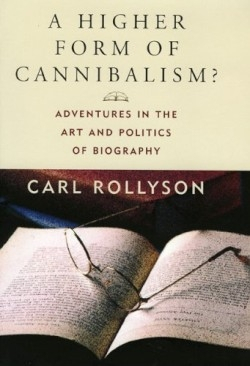A Higher Form of Cannibalism?
Adventures in the Art and Politics of Biography
A biographer has a difficult task. If a person has reached a position interesting enough to warrant a biography, then he or she has surely created a persona that has been as calculatingly shaped as any work of fiction. Tampering with this persona, by telling the truth, or by exposing more than the biographical subject wishes to expose, places the biographer in a position of intense criticism.
If the biography is authorized by the subject, then the biographer can become seduced by the allure of materials unavailable to the public, or by the subject’s carefully created personal mythology. If the biography is not authorized (and most biographies are not), then the author may be criticized for not having access, for hounding living witnesses and the subject, and of being either too reverent or not respectful enough of the subject’s family, privacy, or communicated wishes.
This intriguing, illuminating book serves as a comparative history of biography as well as an examination of the author’s personal education in the perils of biographical writing. A professor of English at Baruch College of the City University of New York, Rollyson has published works including biographies of Rebecca West, Norman Mailer, Lillian Hellman, and Marilyn Monroe.
Over the past fifty years, biography has been criticized for an obsession with salacious private details of a subject’s life. Rollyson shows that this criticism has always existed, by looking first at historic biographical writers such as Johnson and Boswell and then at contemporary biographers like Kitty Kelly. What is new is the modern belief that an individual’s work and life should be—and can be—judged separately. The irony is that the more the subject withholds information, the more likely it is that the biographer will be intrusive. The subject raises objections for precisely the reason that the biographer is necessary: only an external observation can accurately depict all of parts of a person’s life rather than just a single point of view.
Having said this, a biographer is rarely above deception. Rollyson spells out the many ways that biographers intrude, wheedle, ingratiate themselves, and resort to deception to achieve their goals. “Writing biography is a shameless profession, an exercise in bad taste and a rude inquiry,” he writes. “We are journalists and sometimes scholars who try very hard to be accurate. But is it any wonder that the biographer’s choice gets expressed as the selection of a victim?”
This book is aimed at an educated reader of biographies and does an excellent job of illuminating the process and criticism of this popular form of writing.
Reviewed by
Peter Terry
Disclosure: This article is not an endorsement, but a review. The publisher of this book provided free copies of the book to have their book reviewed by a professional reviewer. No fee was paid by the publisher for this review. Foreword Reviews only recommends books that we love. Foreword Magazine, Inc. is disclosing this in accordance with the Federal Trade Commission’s 16 CFR, Part 255.

